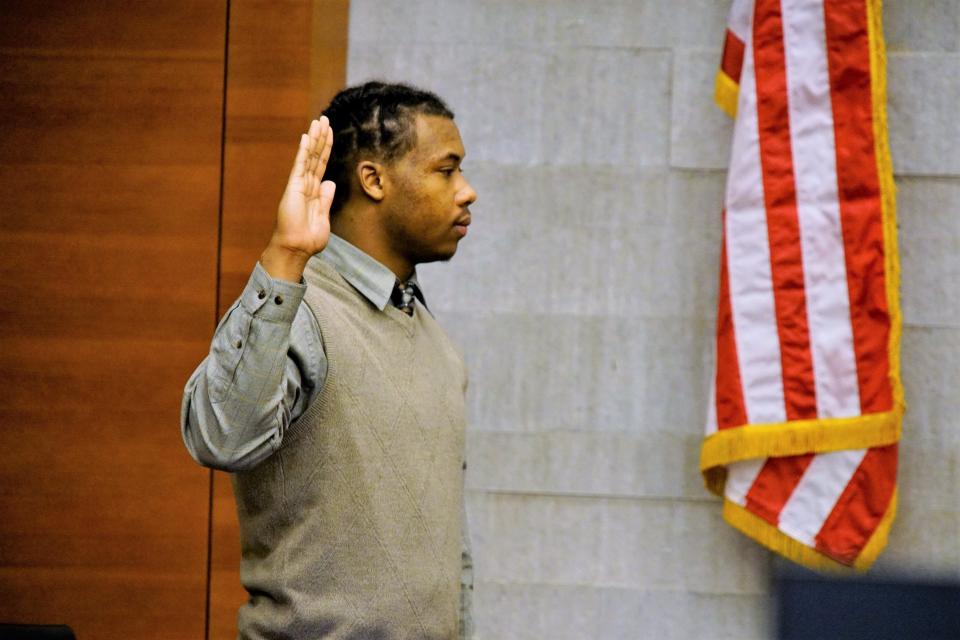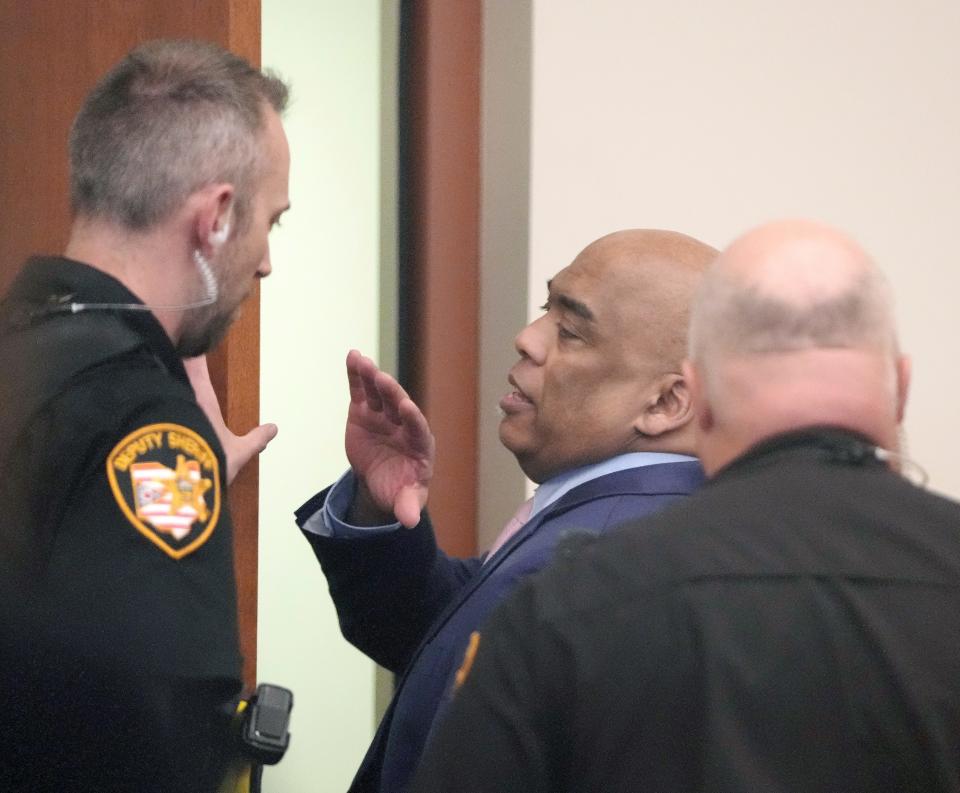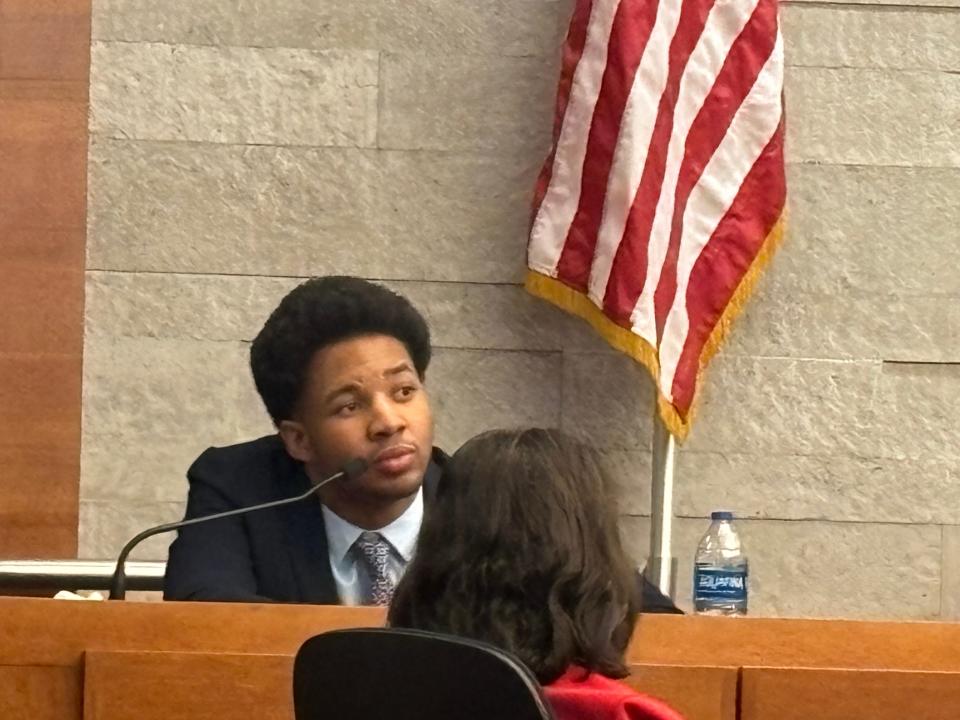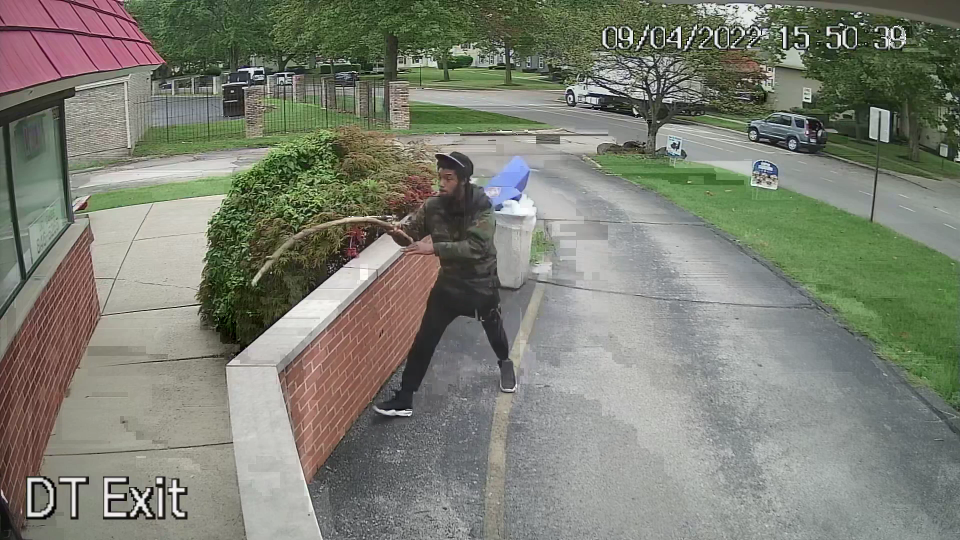Arguing self-defense increasingly popular and effective in Columbus murder trials

Kyrique Camper was 19 on Oct. 17, 2022, and not legally allowed to have a handgun, let alone have a loaded one in his lap while he drove on Columbus’ Northeast Side.
Camper testified at his murder trial in December in Franklin County Common Pleas Court that while waiting for a stoplight that night, he saw through his car’s tinted windows a “shadow figure” approaching.
“My first instinct was to point – I pointed my gun and shot once,” Camper said.
A jury later found Camper not guilty of murder in the shooting death of 17-year-old A’niyah Elie.
Defendants in Franklin County are asserting they killed in self-defense much more often than they used to before changes in state laws in recent years, according to county prosecuting attorneys and police.
And more than half the time in such trials, the defendant has won.
In 2023, eight of the 14 defendants in Franklin County who argued at trial they killed to protect themselves or another person were acquitted, according to an analysis by The Dispatch.
Defense attorneys and prosecutors disagreed on whether it has become easier to win acquittal since Ohio’s Republican-controlled legislature changed laws in recent years. In 2019, the burden of proof in cases where defendants claim self-defense was shifted from the defense to the prosecution. In 2021, the General Assembly removed the duty to retreat, making Ohio a "stand your ground" state starting in 2022.
Robert Barnhart, a Capital University Law School assistant professor, said it's a "perfect storm" that makes authorities' path to a guilty verdict more difficult.
David Zeyen, deputy chief counsel in the criminal division of the Franklin County Prosecutor’s Office, said that, in his experience, the law changes impede convictions.
Columbus criminal defense attorneys say they don't think so.
“The way juries look at it, it’s either self-defense, or it isn’t,” said attorney Joseph R. Landusky II, who argued self-defense in three murder trials in 2023, winning two acquittals.
Multiple attorneys told The Dispatch there has been a rise in these kinds of homicides, not just trials. With more people carrying guns than ever before, attorneys said some gun holders seem to have itchy trigger fingers, and people fear getting shot.
"Everybody potentially has a gun, everyone’s a threat, and everyone can defend themselves," said Barnhart.
Guns and homicides
Zeyen said the 2022 law change allowing Ohioans to carry concealed handguns without a permit is a big part of the story here.
According to a study published this week under a partnership between Ohio Attorney General Dave Yost and Bowling Green State University, six of Ohio’s eight largest cities saw less gun crime after the state’s "constitutional carry" law took effect in 2022. Researchers looked at data on gun crimes from June 2021 to June 2023 – a year before and a year after the law took effect.
State Rep. Latyna Humphrey, D-Columbus, an opponent of constitutional carry, said the report does not establish causation and more research needs to be done into the complex factors influencing crime rates.
Sam Shamansky, a Columbus defense attorney who argued self-defense in two murder trials in 2023, said the proliferation of handguns has contributed to more deaths.
“Even the slightest conflict can turn into a homicide scene,” Shamansky told The Dispatch. “'Gee, you bumped into my car, disrespected my girlfriend, looked at me funny. I’m going to reach for my gun first.’”
In a May trial, Shamansky represented 23-year-old Bria Henslee, whom a jury acquitted of murder for driving her vehicle into Makaela Ellis, 25. Ellis and others confronted Henslee on April 9, 2021, after Henslee hit a parked vehicle nearby and drove away. Ellis was holding a gun, but prosecuting attorneys and Shamansky disagreed if Ellis was pointing the gun.
Henslee used her vehicle to crush Ellis against the wall of a combination Kentucky Fried Chicken and Long John Silver’s on Columbus' Southwest Side.
“With Bria Henslee’s case, this was nothing more than a fender bender where she bumps someone’s car until hoodlums run her down and put guns on her,” Shamansky said.

Shamansky said Ohioans are “reaping what we sow” for allowing so many people to have guns without proper training.
During cross-examination of Camper at trial, Keith McGrath, senior assistant prosecuting attorney, asked why Camper had a gun on him that night.
“Everyone around me has guns. Everyone outside has guns. And when I leave the house, I protect myself," Camper said.
‘Kyrique, why did you shoot the gun?’
When she died, Elie was a month away from turning 18 and had recently graduated from Focus North High School, according to Michelle Sharp, Elie’s grandmother and guardian.
Sharp spoke through tears, often struggling to continue while testifying about the fatal shooting during Camper’s jury trial last month.

Sharp said Elie spent her final hours working at two different Kroger stores. During her second shift at the Kroger at 1350 N. High St, Elie ran into 19-year-old Keiara Solomon, Camper’s girlfriend.
What exactly happened between the two females is unclear. Soloman did not testify during Camper’s trial. A prosecuting attorney said Soloman “felt that she had some beef with A’niya."
Former friends, the two girls had had a falling out, according to Robert Krapenc, Camper’s defense attorney.
“Apparently, A’niya was mean-mugging her and staring at her, and Keiara said, 'What’s your problem?' And words developed to the point where A’niya said, 'I’m off at 9:15 if you want to settle this,'” Krapenc said.
Elie called her grandmother, who got into a car with Elie’s mother, sister and a friend, and they drove to the grocery store.
“A'niyah said, 'Grandma, it’s this girl and this guy, and they’re at Kroger, and they’re threatening me and harassing me and I’m scared, and could you please come and get me,’” Sharp said.
Solomon had left Kroger and brought back Camper and a friend.
Krapenc said Camper’s role that night was to ensure this was a one-on-one fight between Soloman and Elie and nobody else.
Elie's family pulled up to the front of the Kroger as her shift ended. Surveillance video from the store's parking lot showed the two groups moved to the side of the building, mostly out of view of the security camera.
Witnesses differed on the particulars of what happened next.
Camper testified that it started as a one-on-one fight between the two girls, but others got involved, and he waded in.
Soloman got pepper sprayed in the face, Camper said. Sharp was also sprayed in the face.
Eventually, the two groups got in their separate cars and drove away.
Less than a mile away, both cars ended up at a stoplight at the intersection of North 4th Street and East 11th Avenue.
Elie jumped out of her family’s car and approached Camper’s vehicle. She was heading for the open front passenger window, prosecuting attorneys alleged, to pepper spray the occupants of Camper’s car.
She didn’t get close, Sharp said.
Camper "shot her like she was a dog in the street. Pow! Like she was a dog in the street,” Sharp said.

Camper told the jury he couldn’t see who was approaching but that the figure had their hands pointed in front of them. He demonstrated by holding his hands pointed in front of him as if mimicking holding a gun.
Camper also said his vehicle was behind another one at the stoplight, so that he couldn't drive away.
“I didn't know who it was, but I know whoever it was wasn’t coming in a friendly way,” Camper said.
During the trial, Krapenc implied that Elie could have been holding a gun. He pointed out that Columbus police did not preserve surveillance video they watched of the shooting.
Camper said he didn't know he had shot Elie until a detective told him days later.
“Kyrique, why did you shoot the gun?” McGrath asked during cross-examination.
“Because I believed I was going to be killed,” Camper said.
After being shot in the chest, Elie staggered back to her family's vehicle. They drove her to Nationwide Children's Hospital, where she later died.
The numbers: how many are acquitted?
Zeyen said that only a handful of murder defendants had claimed self-defense each year before the changes in state law.
“I have tried more self-defense trials in the past two years than I have in the previous 30,” he said.
Columbus police Cmdr. Mark Denner, who oversees homicide and felony assault detectives, said his detectives also have noticed the increase in self-defense claims.
"With the change in the law, it seems like it’s becoming more immediately apparent," Denner said. "If people are willing to talk, we hear that (self-defense). Whether that’s a true claim, though, is something yet to be determined."
In 2023, 14 defendants, representing nearly half of all 32 murder trial defendants in Franklin County Common Pleas Court, argued they killed to protect themselves or another.
Just five of the 14 defendants were found guilty of murder by a jury, but a judge could still overturn one of those five guilty verdicts from December. And in one trial, the jury was hung and could not reach a verdict.

In addition to Kyrique Camper and Bria Henslee, whose cases were discussed above, the six other defendants who argued self-defense and were found not guilty of murder by a jury or judge were:
Robert Bowens Jr., 23, who returned fire and killed his ex-girlfriend's new boyfriend in 2020.
David Reid, who beat a homeless man to death in 2020. Reid’s attorneys said the other man had come to Reid’s boarding house to attack him. Prosecuting attorneys said Reid's force was excessive.
Andrew Mitchell, a then-undercover Columbus police vice officer, who shot a prostitute in his vehicle in 2018 after he could not produce a badge and she stabbed him in the hand. She fled to the back seat of the car but couldn't get out because the passenger side was parked against a building and the child lock was on the rear driver's side door.
Anthony Wilkes, who shot his cousin during a scuffle in 2021 after Wilkes said his cousin threatened him.
Leeyonna Ward, who, video shows, fatally shot a man who carjacked her in 2021.
Randy Cooper, who testified he was a marijuana dealer who killed another marijuana dealer, 41-year-old Dalin Green, in self-defense during an exchange of gunfire in 2022. Which man shot first was in dispute.

But only examining the cases that make it to trial doesn’t tell the whole story.
Franklin County Senior Assistant Prosecuting Attorney Dan Cable said dozens of defendants say they acted in self-defense but take plea deals to manslaughter or some other lesser charge.
And looking at just trials and pleas doesn’t account for homicides where a grand jury decided it was justifiable self-defense and did not indict.
Homicides that don’t lead to indictments
In the fatal 2022 shooting of 13-year-old Sinzae Reed, a grand jury decided not to indict 37-year-old Krieg Butler for murder after he allegedly told Columbus police he was returning fire.
The grand jury indicted Butler in May on charges of tampering with evidence and improper handling of a firearm in a motor vehicle related to the shooting on Oct. 12, 2022, at the Wedgewood Apartments complex in Columbus’ Hilltop neighborhood.

Zeyen said at Butler’s arraignment that witnesses had told Columbus police a boy in a hoodie and mask shot at Butler in his truck before Butler fired back, killing the boy. Zeyen also said other witnesses said somebody removed a firearm from next to the boy before police arrived.
Reed’s mother, Megan Reed, has said her son did not have a weapon, and she’s accused people of lying to police to protect Butler.
Self-defense cases in Akron: Brothers sentenced for assault in teen's death
A different fatal shooting went before a Franklin County grand jury in February 2023 and did not result in an indictment for murder — or national headlines like Reed’s death did. In that case, the grand jury did not indict on any charges, so the shooter’s name has not been made public.
The Dispatch obtained the police report and the surveillance video footage of the shooting presented to the grand jury.
Over Labor Day weekend 2022, the owner of a Dairy Queen on 1900 Tamarack Circle South shot 33-year-old Adrian Marcus Carr in the business’ parking lot.
The footage, which has no audio, shows Carr, a Black man, rummaging through a trash can near the end of the Dairy Queen drive-thru while holding a large stick. A man only identified as the store owner opens a door from the store and appears to say something to Carr, who immediately becomes agitated. Carr hits a low brick wall in between the two men with his stick, then moves toward the owner in the doorway, pointing his stick toward him as he moves. The owner pulls out a handgun from his front pocket and shoots once, killing Carr.
The whole thing, between the store owner opening the door and Carr falling to the ground, took five seconds.
According to the Columbus police report, the shooter told officers that Carr "got a crazy, angry look." He said he believed Carr would strike him and injure his employees.

Carr’s mother told Columbus police later that Carr had schizophrenia but was not “the violent type.”
Zeyen said that even under the previous law, the owner of the Dairy Queen had no duty to retreat.
“If you are in your home, and at some point it was specifically extended to a business, which is like your home, you don't have a duty to retreat, even if you safely can do so, even if you can safely shut the door, lock it and you are 100% safe,” Zeyen said.
Zeyen said his office could not comment on how grand juries deliberated in specific cases. But he said there are likely some cases now where a grand jury declines to indict that they may have indicted before the laws changed.
Legislators react
When Ohio passed a law removing the duty to retreat in 2021, Black state legislators were united in denouncing the bill, saying it instituted "stand your ground" and put Black lives at risk.
Carr’s and Reed’s deaths both represent cases where a white man fatally shot a Black male and was not indicted for murder.
Out of the 14 murder trials where self-defense was argued in 2023, 10 of the defendants and 10 of the individuals who were killed were Black. In most homicides in Franklin County, the suspect’s race matches the victim’s race, according to Columbus Division of Police records.
State Rep. Humphrey, a former Franklin County Court of Common Pleas bailiff and the sponsor of a bill to repeal Ohio's stand-your-ground law told The Dispatch that African Americans and people of color are predominantly impacted in self-defense incidents. She said more research needs to be done to determine how racial biases are playing out in Ohio's court system in the application of stand your ground, but it would also be impossible to address those biases with legislation.
"We should have listened to law enforcement when they were telling us this was a bad idea," Humphrey said of the Ohio General Assembly. "We really need to repeal the stand-your-ground law. This was a bad idea, and we’re seeing that in the city of Columbus."
Kyle Koehler, a Republican state representative from Springfield from 2015 to 2023 who was instrumental in removing the duty to retreat from Ohio law and supported permitless carry, said he does not think these laws have increased shootings.
"You used to have to prove you couldn't run away. I don’t think a woman getting into her car at Walmart should have to consider if her attacker can stab her quicker than she could run away. That’s all the duty to retreat change did," Koehler said. "I just think the regard for human life has changed over the last three years."
Koehler said he pushed for legislation while in the statehouse that would require gun dealers to provide buyers with a piece of paper that pointed them toward information on Ohio's concealed-carry laws.
"I don’t want to infringe on somebody’s right to buy a gun," Koehler said. "At the same time, I sure hope anybody who buys a firearm takes the time to learn how to use it and understand the law."
Trend likely to continue
Zeyen with the Franklin County Prosecutor's Office said Ohio is not the Wild West where people can get away with anything by claiming self-defense, but some people think — and act — like that is the case.
“People need to know that there are rules still in place,” Zeyen said. “If it's appropriate, you're going to be charged."
The prosecutor's office is developing strategies to deal with self-defense claims, such as asking potential jurors about the topic during jury selection.
"We are meeting with some success," Zeyen said.
Barnhart told The Dispatch that Columbus is going to continue to see rising assertions of self-defense.
"It is completely going to continue to be a trend. Defense attorneys in this town are too good for it not to be," Barnhart said. "And the prosecutors are good too, but when you’ve got a burden to prove a negative, that’s tough."
After the verdict in the Camper case, the attorneys got the chance to speak with jurors informally about their decision.
According to McGrath, jurors said it was a tough case, and they weren't walking away happy.
The jurors felt the prosecution failed to disprove self-defense, McGrath said, but didn't give any other indication why they decided what they did.
“I wish they had because then it would help me with the next case,” he said.
Dispatch staff writer Bethany Bruner contributed to this report.
jlaird@dispatch.com
@LairdWrites
This article originally appeared on The Columbus Dispatch: Columbus defendants on trial for murder arguing self-defense more

